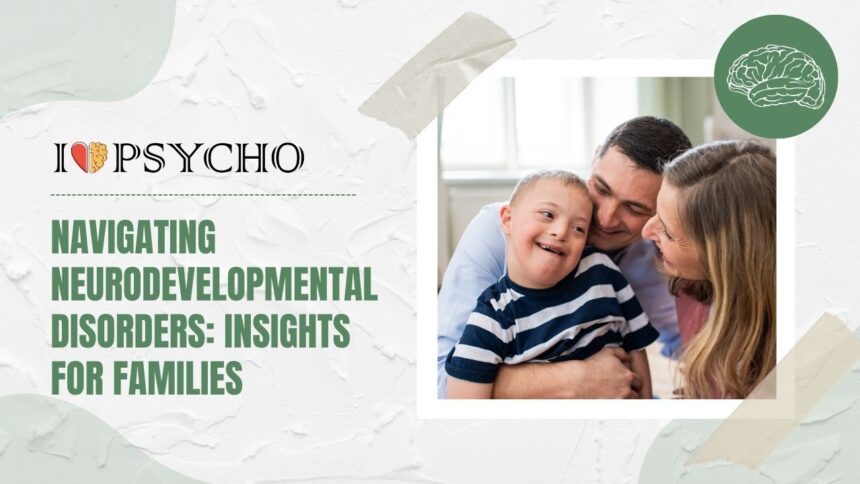Welcome to a guide that aims to shed light on neurodevelopmental disorders, providing valuable insights for families navigating this complex landscape. From understanding the different types of disorders to exploring symptoms and diagnosis, this article is your roadmap to gaining a deeper understanding of how these conditions can impact individuals and their loved ones. Let’s embark on this journey together and discover ways to support those facing neurodevelopmental challenges with compassion and knowledge.
What are Neurodevelopmental Disorders?
Neurodevelopmental disorders refer to a group of conditions that affect brain function and development. These disorders typically manifest early in life and can impact various areas such as learning, communication, behavior, and motor skills. Conditions like autism spectrum disorder (ASD), attention-deficit/hyperactivity disorder (ADHD), intellectual disabilities, and specific learning disorders fall under this umbrella term.
Individuals with neurodevelopmental disorders may experience challenges in social interactions, speech and language development, cognitive abilities, or sensory processing. The exact cause of these disorders is often complex and involves a combination of genetic, environmental, and neurological factors.
It’s crucial to understand that each person with a neurodevelopmental disorder is unique in their strengths and areas of difficulty. By recognizing the individuality of each case, we can better tailor support strategies to meet their specific needs.
Common Types of Neurodevelopmental Disorders
Neurodevelopmental disorders encompass a range of conditions that affect brain function and development.
One common type is Attention-Deficit/Hyperactivity Disorder (ADHD), characterized by difficulties with attention, hyperactivity, and impulsivity.
Autism Spectrum Disorder (ASD) is another prevalent neurodevelopmental disorder, impacting social interaction, communication skills, and behavior patterns.
Intellectual Disability involves limitations in intellectual functioning and adaptive behaviors.
Specific Learning Disorders like dyslexia affect reading, writing, or math skills despite normal intelligence levels.
Communication Disorders such as speech or language impairments can also fall under the umbrella of neurodevelopmental disorders.
Each condition presents unique challenges for individuals and families alike but understanding their differences is key to providing appropriate support and interventions.
Symptoms and Diagnosis
Navigating neurodevelopmental disorders can be challenging for families, especially when it comes to understanding the symptoms and obtaining a proper diagnosis. Symptoms of these disorders vary widely, from difficulties with communication and social interaction to repetitive behaviors or restricted interests.
It’s essential for families to pay close attention to any developmental delays or unusual behaviors in their children. Early recognition of potential symptoms is key in getting timely intervention and support. However, diagnosing neurodevelopmental disorders can be complex and may involve assessments by healthcare professionals such as psychologists, psychiatrists, or developmental pediatricians.
A comprehensive evaluation typically includes observing the child’s behavior, conducting interviews with caregivers, and utilizing standardized assessment tools. Diagnosis is crucial as it guides treatment approaches tailored to the individual’s specific needs. Remember that seeking professional guidance is vital in navigating this journey effectively.
Early Detection and Diagnosis
Early detection and diagnosis play a crucial role in managing neurodevelopmental disorders. Identifying symptoms early can lead to timely interventions and better outcomes for individuals affected by these conditions. It’s essential for families and caregivers to be aware of the signs that may indicate a neurodevelopmental disorder in their loved ones.
Observing developmental milestones is key in recognizing any delays or atypical behaviors that could signal an underlying issue. Seeking guidance from healthcare professionals specializing in neurodevelopmental disorders is vital for accurate assessment and diagnosis.
Diagnostic evaluations often involve comprehensive assessments, including physical exams, developmental screenings, behavioral observations, and interviews with parents or caregivers. These evaluations help in determining the presence of a neurodevelopmental disorder and formulating an appropriate treatment plan tailored to the individual’s needs.
Remember, early intervention is key when it comes to supporting individuals with neurodevelopmental disorders on their journey towards reaching their full potential.
Treatment Options for Neurodevelopmental Disorders
Navigating treatment options for neurodevelopmental disorders can feel overwhelming, but there are various approaches available to support individuals in managing their symptoms.
Behavioral therapy is a common intervention that focuses on teaching new skills and reducing challenging behaviors. It can help individuals develop coping strategies and improve social interactions.
Medication may also be prescribed to manage specific symptoms associated with neurodevelopmental disorders, such as attention-deficit/hyperactivity disorder (ADHD) or anxiety.
Alternative therapies like occupational therapy or speech therapy can provide additional support tailored to the individual’s needs, helping them enhance their daily functioning and communication skills.
It’s essential for families and caregivers to work closely with healthcare professionals to create a comprehensive treatment plan that addresses the unique challenges of the individual with a neurodevelopmental disorder.
Coping Strategies for Families and Caregivers
Coping with neurodevelopmental disorders can be challenging, but there are strategies that families and caregivers can implement to support their loved ones effectively. It’s essential to educate yourself about the specific disorder your family member has – understanding the symptoms and behaviors can help you respond in a more informed manner.
Building a strong support network is crucial. Connect with other families facing similar challenges; sharing experiences and advice can offer valuable insights and emotional support. Taking care of yourself is just as important – remember to prioritize self-care to maintain your own well-being.
Establishing routines and structure can provide stability for individuals with neurodevelopmental disorders. Consistent schedules help reduce anxiety and improve overall functioning. Additionally, practicing patience, flexibility, and empathy goes a long way in creating a harmonious environment at home.
Seeking professional guidance from therapists or counselors specialized in neurodevelopmental disorders can provide additional coping mechanisms tailored to your family’s unique needs. Remember, it’s okay not to have all the answers – reaching out for help is a sign of strength, not weakness.
Supportive Resources for Families
Navigating neurodevelopmental disorders can be a challenging journey for families and caregivers. It’s important to remember that you are not alone in this experience, and there are supportive resources available to help you along the way.
Support groups can provide a sense of community and connection with others who understand what you’re going through. These groups offer a safe space to share experiences, gain insights, and receive emotional support from people facing similar challenges.
Educational workshops and seminars can equip families with valuable information about neurodevelopmental disorders, treatment options, coping strategies, and resources available in their community. These events can empower families with knowledge and tools to better navigate their unique situation.
Online forums and websites dedicated to neurodevelopmental disorders often offer a wealth of resources, including articles, videos, webinars, and online support groups. These platforms can be a convenient way to access information and connect with others, particularly for families who may have limited mobility or live in remote areas.
Counseling and therapy can provide families with a safe and confidential space to discuss their experiences, feelings, and concerns related to their child’s neurodevelopmental disorder. Therapists can offer coping strategies, emotional support, and guidance on how to navigate the challenges of raising a child with special needs.
Community organizations and advocacy groups focused on neurodevelopmental disorders can connect families with local resources, support services, advocacy efforts, and events. They may also offer volunteer opportunities for families who want to get involved in supporting others in the community.
In addition to these resources, it’s important for families to take care of themselves while caring for a child with a neurodevelopmental disorder. This may include seeking respite care or asking for help from family members and friends when needed. It’s also essential to prioritize self-care activities such as exercise, hobbies, relaxation techniques, and socializing with loved ones. Taking care of your own physical and emotional well-being will not only benefit you but also allow you to better support your child.
Conclusion
Navigating neurodevelopmental disorders can be overwhelming for families, but with the right support and resources, it is possible to find ways to manage these conditions effectively. By understanding the common types of neurodevelopmental disorders, recognizing early symptoms, seeking timely diagnosis, exploring various treatment options, and implementing coping strategies for both the individual affected and their caregivers – families can navigate this journey with resilience.
Remember that each individual’s experience with a neurodevelopmental disorder is unique, and what works for one may not work for another. It is essential to approach each situation with patience, empathy, and an open mind. Seeking support from healthcare professionals, therapists, educators, and support groups can provide valuable insights and guidance along the way.
Above all else, remember that you are not alone in this journey. There are numerous supportive resources available for families navigating neurodevelopmental disorders. By tapping into these resources and building a strong support network around you or your loved one affected by a neurodevelopmental disorder – you can empower yourselves to face challenges head-on while celebrating every achievement along the way.
With dedication, understanding, patience, and unwavering love – families can thrive despite the challenges posed by neurodevelopmental disorders. Together we stand stronger!









